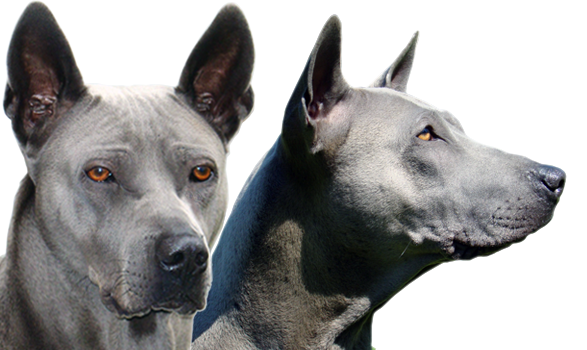FAQ
Yes. First the breed was recogniced by the FCI in 1993 as well as from the VDH in 1994. The breed is shown in VDH shows in Germany and FCI shows throughout most of the world.
Are they easy to train?
Easy but ou have to be concepuent and always fair to your dog. In Thailand there are frequent obedience shows run by the DAT, the Dog Association of Thailand, whose current standard abbreviation is AT. The agility and obedience requirements are extensive, equivalent to the Master Agility Excellent and Obedience Trial Champion titles in the US as well as in Europe.
Would they make good watch dogs? Guard dogs?
The Ridgeback is an excellent natural watchdog and family protector, requiring only that the owner has control over it.
Are they noisy? Do they have any bad habits?
Ridgebacks tend to bark only when there is something unusual about (unless one has fallen into bad habits out of boredom). They are very athletic, easily able to clear high fences unless the owner has taken proper precautions to see this does not occur. The Ridgebacks love to run. This can be a good or bad habit depending on the owner.
Is the Ridgeback a good house-dog?
The Ridgeback is an extremely clean dog with no odor due to its short tropical coat. As tropical dogs they do not tolerate cold weather well, unless they are adapted to it. They do not drool, except occasionally in anticipation of food. They are generally easy to house break. They will take over the furniture unless their owners discourage this habit from puppy hood. They are well sized, not so small as to be underfoot, yet not so big that they are constantly in the way; yet big enough to intimidate a prowler. Their upright tails wag in a short radius, not knocking over your house plants or coffee table glasses.
Are there any special feeding problems?
Ridgebacks are true omnivores. In Thailand an ancient text says they are able to feed themselves digging the earth in search of small prey. Along the beaches they actively forage for small crabs. They will inhale their food enthusiastically. Consequently Ridgeback owners need to monitor their dogs weight and cut back to prevent obesity.
How much exercise does a Ridgeback need?
Like any medium-large dog, Ridgebacks need exercise - a daily romp in the backyard or park and a couple of long trips should be sufficient.
Again, Ridgebacks love to run. More exercise would be better but Ridgebacks do adapt to their people.
Are they a rare breed?
Yes, there are less than 300 Thai Ridgebacks registered in Europe. However, more than fivethousand are registered world wide, the vast bulk with the DAT in Thailand.
Does this mean I will have trouble finding a puppy?
Yes. You may have to wait some time for a litter and you will likely have to have it shipped across the country to you. Litters in Europe are few (there are currently only a few breeders) and demand for the puppies is high. While many dogs exist in Thailand, they are kennel raised and no puppy can be imported into the Europe until it is at least 4 months old and has it’s rabies vaccination.
(source: www.thai-ridgeback.com)
Unsere Hunde gehören zu den besten ihrer Rasse.
Dies ist nicht nur auf nationale und internationale Siege zurückzuführen,
sondern viel mehr dank eines einzigartig schönen Wesens.
Wir halten nichts von Massenzucht und achten in erster Linie auf Gesundheit unserer Tiere!
Achtung von inkompetenten Massenzüchter!
Vergleichen Sie bitte nicht nur die Preise, sondern auch die Qualität.
Beim Kauf eines Welpen aus Massenzucht können folgende Ereignisse eintreten:
1) Der Welpe kann qualvoll wegen DS-Krankheit sterben, weil die Züchter entweder nichts über die Krankheit wissen oder keine einwandfreie Ahnentafel besitzen und ohne FCI Aufsicht bzw. ohne Zuchtwartuntersuchung die Welpen vertreiben. Wenn es soweit kommt, ist die Krankheit wegen Nervenbeschädigung kaum heilbar.
2) Sie fördern die Ausbeutung der Tiere, indem Sie Massenzüchter unterstützen. Diese Tiere werden lebenslang gequält. Nachdem die Hündin nicht mehr werfen kann, wird sie entweder verkauft, abgegeben oder eingeschläfert, da die Hündinnen für die Züchter reine Produktionsmaschinen sind. Diese Tiere sind auch nicht FCI zertifiziert.
3) Viele dieser Welpen landen oft im Tierheim, weil die Züchter sie nicht zurücknehmen wollen.








